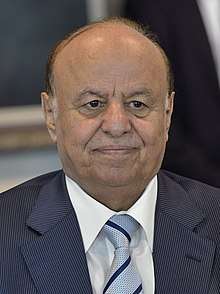President of Yemen
The President of the Republic of Yemen is the head of state of Yemen. Under the Constitution of Yemen, the president is also the Supreme Commander of the Armed Forces and head of the executive branch of the Yemeni government.
| President of the Republic of Yemen | |
|---|---|
 | |
| Residence | Riyadh, Saudi Arabia (Hadi government) |
| Term length | Seven years, renewable indefinitely |
| Inaugural holder | Ali Abdullah Saleh |
| Formation | 22 May 1990 |
| Deputy | Vice President of Yemen |
| Salary | 280,000 YER monthly[1] |
| Website | presidenthadi-gov-ye.info/en/ |
 |
|---|
| This article is part of a series on the politics and government of Yemen |
|
|
|
Executive |
|
Legislature
|
| Judiciary |
|
|
|
The first President of unified Yemen was Ali Abdullah Saleh and the second and current President of Yemen is Abdrabbuh Mansur Hadi, who took office on 27 February 2012. The legality of his claim to presidency is in question, as he was the only candidate in the 2012 election and the end of his mandate was originally set for 27 February 2014.[2] His mandate was extended for another year.[3] However, he remained in power after the expiration of his mandate, and on 22 January 2015, he handed over his resignation.[4] He reaffirmed that he intended on resigning two weeks later.[5] After his resignation, the government was assumed by Supreme Revolutionary Committee. However, on 21 February 2015, Hadi presented himself as the president again, in Aden. His role is contested by the Houthi Supreme Political Council's president, Mahdi al-Mashat, who is only recognized by Iran and Cuba.[6][7][8]
Latest election
| Candidates – Nominating parties | Votes | % |
|---|---|---|
| Abdrabbuh Mansur Hadi – General People's Congress | 6,621,921 | 99.80 |
| Total votes (turnout 64.78%) | 6,635,192 | 100.00 |
| Registered voters | 10,243,364 | |
| Source: Le Figaro | ||
See also
- President of Yemen Arab Republic (North Yemen)
- List of heads of state of Yemen
- List of leaders of South Yemen
References
- برس, مأرب. "مأرب برس - راتب الرئيس ونائبة والوزراء بعد الإستراتيجية". مأرب برس.
- Profile: Yemen's Abd-Rabbu Mansour Hadi
- Yemeni president's term extended, Shi'ite Muslim leader killed
- Hadi affirms her presidential resignation final
- Hadi affirms his presidential resignation final
- "Yemen: Houthi, Saleh council formation criticised by UN". www.aljazeera.com.
- https://www.bloomberg.com/news/articles/2019-08-18/yemen-shiite-rebels-appoint-an-ambassador-to-iran-for-first-time
- http://www.cadenagramonte.cu/english/show/articles/28389:yemeni-deputy-fm-praises-cuba-s-support-for-arab-causes

